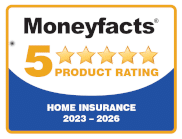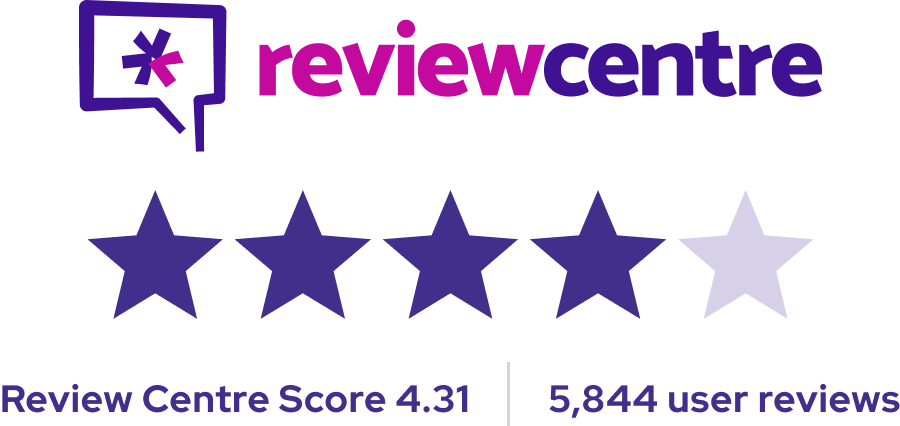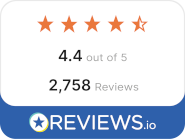UNDERSTANDING EMPTY HOUSE INSURANCE
Let’s define unoccupied: as far as the insurance industry is concerned, an empty property is one that is uninhabited for more than 30 days. This is often referred to as the 30 day rule by insurers, or even the 30/60/90 day rule because some providers – unlike Homeprotect – won’t cover a property at all if it’s vacant for more than 60 or 90 days.
Whether a vacant house is furnished isn’t important – which is why empty homes are often referred to as unoccupied properties by insurance providers.
IN THIS GUIDE
Why empty house insurance is important | Unoccupied main residence
Untenanted properties | Probate and inherited homes | Flexible insurance for an empty property
Why it’s important to have empty house insurance
Perhaps the simplest reason for insuring an unoccupied home is because your mortgage company requires you to have buildings cover in place as a condition of the loan. This obviously applies to holiday homes, second homes, and buy-to-let property, as well as your main residence if you’ve moved out during renovations or you have to be away with work for an extended period.
But if you own your empty property outright – perhaps because you’ve inherited it, or because you’ve already paid it off and are now planning a long holiday during your retirement – you’ll want the peace of mind that comes with knowing you’re protected if the worst happens whilst you’re away.
When it comes to insuring an unoccupied property, it’s worth remembering that even buildings-only insurance for an empty house covers you for more than just damage caused by fire, lightening or smoke; Homeprotect policies also include protection against legal liability, for example, if a tile comes off your roof and damages your neighbour’s conservatory.
Empty home insurance for your main residence
As insurance companies consider a property to be unoccupied if it’s empty for more than 30 days, the level of cover included in empty property insurance usually changes at this cut-off point, with further changes the longer a home is left vacant.
With Homeprotect empty property insurance for your main home, for instance, if your property is unoccupied for more than 30 days in a row between 1 October and 1 April, you’ll need to turn off the water or keep the heating on continuously for your usual cover levels to remain in place. This is to reduce the risk of damage caused by water escaping from frozen pipes bursting.
It’s also always a good idea to arrange for someone to maintain your garden and hedges so that the property looks lived in as this will help it avoid unwanted attention from burglars.
Empty property insurance for untenanted properties
Landlords understandably dread void between tenants, but they’re also a fact of life if you have a buy-to-let property. And sometimes you may actually choose to leave your property tenantless for a period, perhaps so that you can decorate it or carry out a more substantial renovation which will allow you to charge higher rents in future or just simply attract tenants more easily. This might include putting in a new kitchen or bathroom, or even build an extension which includes an extra bedroom.
If your property is vacant, it’s important that you tell your insurance provider this to avoid unpleasant surprises in the event you need to make a claim. In the case of Homeprotect policies, we need to know if this type if property is untenanted for more than 30 days. As we specialise in renovation cover as well as landlord insurance, it’s likely that you’ll only need to adjust your existing Homeprotect policy in either of these situations, but the important thing is that you keep us up to date with what’s going on.
Insurance for an empty property that’s in probate or inherited
If you’ve inherited an empty property or you’re the executor for someone‘s will that is going through probate, it’s important that you insure the unoccupied property until such time as it is sold or rented out.
Unused properties which have belonged to an elderly person may not have been maintained, so you may need to fit better window or door locks in order to get competitively-priced empty house insurance, or even to get cover at all. This will reduce the risk of squatters gaining access to the property, which almost always causes the property owner a lot of work as well as worry.
Tip: Although boarding up windows may seem more secure than leaving dilapidated window frames without locks – and is cheaper than upgrading old windows – this advertises the fact that the property is unoccupied to squatters and vandals who might set fire to it.
Flexible insurance for empty properties
Many of the reasons why a home is empty are temporary – while you’ve moved out during renovations, while a let property is tenantless, or when an elderly relative has moved into a care home, as well as many other situations. When everything returns to normal and your empty house is reoccupied, just let us know that too.
There are generally some changes in premiums payable and the levels of cover provided as your circumstances vary, but it’s worth remembering that we cover a wide variety of situations including many that mainstream insurers refuse to handle.
And don’t forget that Homeprotect policies run for a full year, whereas with some insurers who offer short-term unoccupied home insurance, you would need to keep renewing if your property remains vacant longer than you’d expected.
What’s covered by UNOCCUPIED HOME insurance?
Your level of cover depends on whether the property is unoccupied for a short or long period.
Short term unoccupancy (31 – 180 days)
If your home is usually occupied but will be empty for more than 30 days — and less than 181 — it is classed as unoccupied, and some restrictions apply.
We continue to offer our standard cover, but we won’t cover the following unless the property is inspected at least once every 30 days:
❌ WE WON’T COVER:
- Escape of water claims occurring on or between 1 October and 1 April
- Jewellery and watches, unless stored in a locked safe with the keys removed
- Theft or attempted theft, unless all security features listed in your Statement of Fact are in good working order and actively used
- Money, under any circumstance
🔍 INSPECTIONS ARE ESSENTIAL
To keep your cover valid, your property must be entered and internally inspected at least once every 30 days. You’ll need to provide evidence at the point of claim — such as dated photos, utility records or smart lock logs.
Long-term or permanently Unoccupied (181+ days)
If your property is unoccupied for more than 180 consecutive days — or is permanently unoccupied — your policy is limited to FLEEA-only cover, unless extended by our underwriting team.
The following table compares what sort of insured events are covered:
| Insured loss | Basic cover (available online) | Extended cover (call for quote) |
| Fire, Lightning, Earthquake, Explosion, Aircraft or other flying devices (FLEEA) | ✔ | ✔ |
| Liability to the public | ✔ | ✔ |
| Escape of Water or oil | ✖ | ✖ |
| Accidental damage | ✖ | ✖ |
| Storm or flood | ✖ | ✔ |
| Subsidence or tree roots | ✖ | ✔ |
| Theft (including attempted theft) | ✖ | ✔ |
| Malicious damage | ✖ | ✔ |
| Collisions with wild animals or vehicles | ✖ | ✔ |
| Aerials & falling objects | ✖ | ✔ |
| Damage by emergency services | ✖ | ✔ |
Want extended protection?
Call our team on 0330 660 1000 to speak to our sales team about extended unoccupied cover.
If approved, we can include cover for additional risks — like storm, flood, malicious damage and theft — but the following restrictions will still apply while the property remains unoccupied:
❌ WE WON’T COVER
- Escape of water or oil
- Accidental damage
❌ WE ALSO WON’T COVER THE FOLLOWING CONTENTS:
- Electronic gadgets
- High risk items (e.g. jewellery, watches, artworks)
- Money
✔ TO BE ELIGIBLE FOR EXTENDED COVER:
- The property must have been lived in within the past two years
- No doors or windows should be boarded up
UNOCCUPIED HOME Insurance Cover Levels
The following cover levels apply for both short and long-term unoccupancy:
unoccupied covers levels with homeprotect
Buildings Cover
Up to £1 million (more cover available if needed)
Protects the main structure of your home, including attached garages and conservatories, and permanent outdoor features such as patios, driveways and boundary walls.
Contents cover
from £25,000
Protects your household contents — including furniture, clothing, appliances, gadgets and valuables — against insured events. Cover is provided on a new for old basis.
Home emergency
up to £500
Covers sudden, unexpected emergencies — like an uncontrollable leak — that require immediate action to prevent damage or make your home secure. Two levels of cover are available, for different types of insured loss.
Liability cover
up to £5 million
Covers your legal liability for accidental death, injury or illness to someone else, or damage to their property.
Outbuildings cover
from £20,000
Covers detached garages, greenhouses, sheds, summerhouses and other outbuildings within your boundary or any communal area you’re legally responsible for.
Family legal protection
up to £25,000
Covers legal costs for certain insured events. There must be a reasonable chance of success, and the incident must happen during your policy term. Two levels of cover are available, for different types of insured loss.
Your Questions Answered
You will need to prove you have an ‘insurable interest’ in the property for Homeprotect to provide cover. Once confirmed, the probate home insurance policy will usually be issued in the name of the executor with any beneficiaries named as additional policyholders.
There are no regulations around how long a homeowner can leave their property unoccupied. However, when it comes to purchasing vacant property insurance with Homeprotect, your home must have been unoccupied for more than 30 days.
If you’re planning to leave your home empty for an extended period, there are a few safety and security considerations. Firstly, after 30 days unoccupied, most home insurance policies are void – so, the homeowner would need an empty home insurance policy to protect against theft or damage. Many empty home insurance policies will also expect the home to be inspected regularly, water and electricity to be switched off and more.
Additional considerations include installing a home security system and using smart devices such as leak detection technology.
If you own the freehold, yes. If you live in a leasehold flat, the freeholder usually arranges buildings cover, but check your lease to be certain.
Yes, Homeprotect is pleased to offer unoccupied home insurance policies for long periods. If your holiday home will be left vacant during the off-season or between guests for more than 30 days, we can still offer cover. Please read more about our unoccupied home insurance to understand what restrictions apply.
Empty properties carry greater risks in terms of burglary, vandalism or even squatting, and also the amount of damage caused by unnoticed issues like burst pipes.
Homeprotect needs to know if your property is unoccupied for more than 30 consecutive days or more so that they can factor these increased risks into your policy terms.
Prefer to SPEAK WITH us?
Our insurance experts are on hand if you have any questions.





